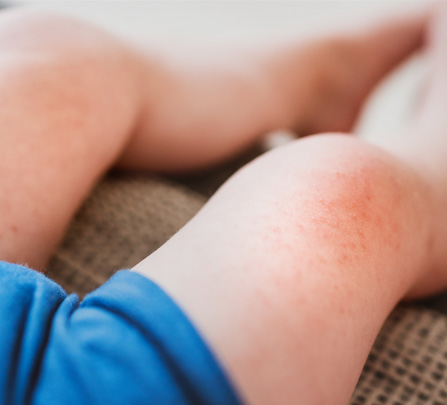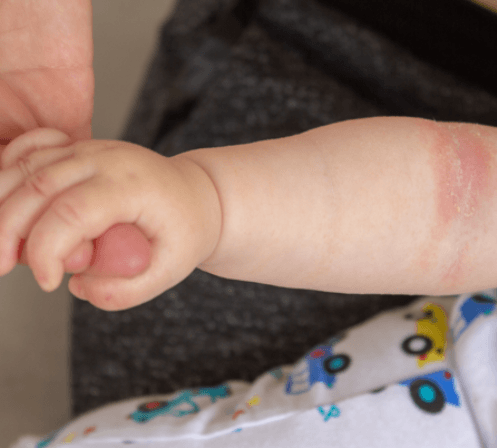Doublebase and your child
Atopic Eczema
Atopic eczema, although it can affect people of all ages, is also sometimes referred to as ‘infantile’ or ‘childhood eczema’.
Atopic eczema is the most common form of eczema. The term ‘atopic’ refers to a hypersensitivity that leads to the body reacting to an allergen that it is not actually in contact with. It tends to be hereditary but does not always pass directly through the generations.


Eczema in Children
Infants and toddlers usually suffer from atopic eczema on the face or elbows and knees – places that are easy to scratch and rub as they are crawling. It may spread to other areas of the body, although not the nappy area, where moisture protects the skin.
In older children, atopic eczema usually appears in the folds of the elbows, hands and/or knees.
The skin of most children with eczema improves as they get older (usually by puberty) and for some the eczema will clear; although there is no way of telling in advance whether this will happen.
Generally, children whose eczema is more severe tend to retain the condition into adulthood. Even if the eczema improves significantly, people who had atopic eczema as a child often have ‘sensitive’ skin as adults.
How to manage eczema in infants and children
While caring for an infant or child with eczema can be upsetting, there are some simple tips that may help soothe your little one.
- Keep baths or showers short, in warm (not hot) water.
- Use non-soap, unscented cleansers and pat the skin dry, applying emollients immediately afterwards.
- Using a bath oil or bath emollient is a personal choice and many parents find them a soothing way to cleanse their child as well as providing a lasting barrier of moisturising oil.
- Try to keep your child’s bedroom cool, as getting hot and sweaty can make eczema worse.
- Keep your child’s fingernails short and smooth to prevent skin damage from scratching.
- Wearing light, breathable gloves in bed will help protect the skin if scratching at night is a problem.
- Encourage your child to drink plenty of water which will help keep the skin hydrated.
- Try to eliminate known allergens from the house, e.g. cigarette smoke, pollen, dust.
- Wearing soft, breathable clothes, made from materials such as cotton and linen, is preferable to harsh, scratchy and warm materials, such as polyester and wool.
- Apply an unperfumed emollient to the affected area(s) several times a day, as and when needed.
- Ensure that the emollient is applied in the direction of hair growth to avoid clogging hair follicles.
For more hints on caring for children with eczema, visit the National Eczema Society at eczema.org/children-eczema
